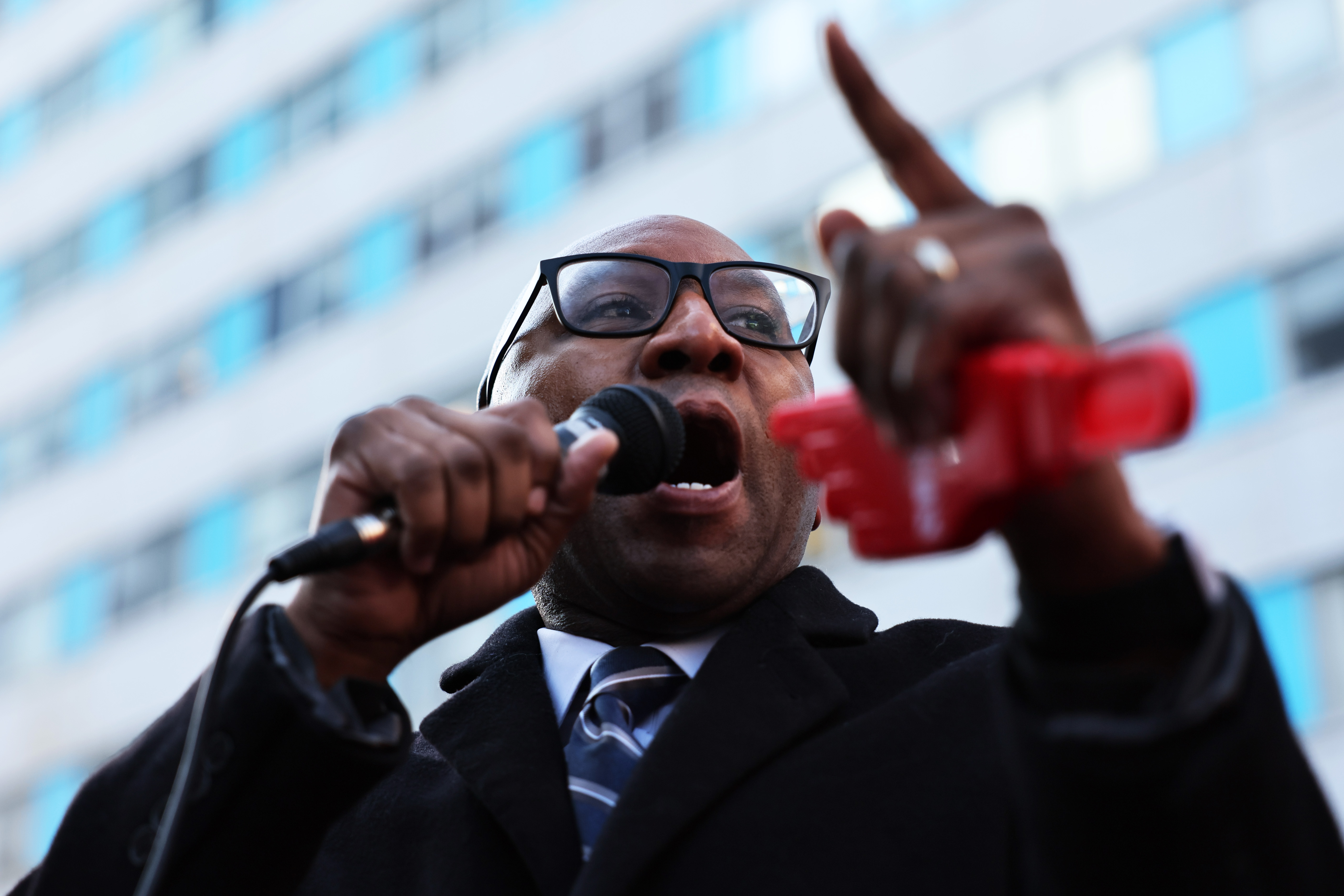Politics
White House officials turn up the heat on Indiana redistricting
Pressure is mounting on Republicans in Indiana to take up redistricting ahead of the midterms, with both White House officials privately pressuring lawmakers and a mysterious group urging voters to call their elected officials in support of it.
White House Intergovernmental Affairs Director Alex Meyer in his personal capacity has called several lawmakers in the state pressing them to redistrict, according to a person familiar with the calls granted anonymity to discuss them.
One lawmaker said to have received a call declined to comment.
The White House is also inviting Indiana Republicans to a meeting in Washington, according to invitations reviewed by Blue Light News. More than four dozen — including the state House speaker and Senate president — have agreed to attend and two have declined, according to a Republican close to the White House.
The White House did not immediately respond to a request for comment.
The calls are part of its broader strategy to use redistricting in order to gain an advantage in the midterms and help Republicans cling to their small House majority.
It’s not just the White House that’s amping up the pressure. MAGA faithfuls, like influencer Charlie Kirk, have also been telling Indiana lawmakers to get on board. In a recent post on X, Kirk asked if Indiana state officials are “going to ignore President Trump, the majority of their voters, and the GOP Grassroots across the country by REFUSING to redistrict Indiana’s Congressional Seats? Let’s hope they are better than that!”
At the same time, a recent robocall received by a Blue Light News reporter living in Indiana accuses Democratic Govs. Gavin Newsom of California and Kathy Hochul of New York of using redistricting with a goal of “ending the Trump presidency” and urges listeners to call GOP state Rep. David Hall and tell him to back the effort.
“We can stop these radicals by doing our own redistricting here in Indiana,” the call said.
The call went to residents of the district of Republican State Rep. Danny Lopez, who came out against redistricting. The narrator identifies the call as paid for by Forward America. There is little public information about the group.
Lopez declined to comment.
The intensive public and private pressure comes as Newsom pushes forward with his plan to offset the potential five-seat gain for Republicans in Texas. The Texas state legislature has been at a standstill since Democratic lawmakers left to prevent the state House from reaching quorum to pass the map. Abbott called a second special session on Friday, and Democratic lawmakers have indicated they are willing to return soon.
Politics
Turkish Adams Donor Sentenced

With help from Amira McKee

THE FINAL STRAW? Construction executive Erden Arkan must not have friends in the Trump administration like Mayor Eric Adams does. So while the Department of Justice moved to dismiss the mayor’s case, the wheels of justice kept turning for Arkan.
The Turkish-American co-owner of KSK Construction Group was given a light sentence of one year probation today in Manhattan federal court. He’ll also pay a $9,500 fine and $18,000 in restitution after pleading guilty in January to giving 10 employees $1,250 each to donate to Adams’ campaign.
But even while accepting that he broke New York City campaign finance laws, Arkan’s lawyer Jonathan Rosen presented him as a victim of “an unprecedented act of prosecutorial discretion,” suggesting that federal prosecutors with the Southern District of New York wanted to salvage some sort of a win following the tumult and rounds of resignations over the dismissal of Adams’ case.
Rosen also suggested Arkan’s case never should have been brought in federal court in the first place, arguing he was “targeted… to serve some greater end in a bureaucratic power struggle over the Adams case.”
While an official from the Turkish consulate helped coordinate Arkan’s May 2021 fundraising event for Adams, Rosen said that Arkan “never had any knowledge of foreign interference” alleged by federal prosecutors. He maintained that neither the Adams campaign nor the Turkish consulate knew about Arkan’s straw donor scheme, which he’d cooked up himself.
Judge Dale Ho dismissed the arguments. While he conceded “it is true that there is some incongruency between the government’s handling of Mr. Arkan’s case and Mayor Adams’ case,” he was firm that “there is not a shred of evidence in the record” indicating that the prosecutors acted wrongly prosecuting Arkan.
Another related case hasn’t been resolved yet. Former Adams aide Mohamed Bahi pleaded guilty Tuesday to helping to organize a separate straw donor scheme for Adams’ 2021 campaign.
While Adams himself hasn’t been accused of coordinating straw donations, the practice has been a serious problem for his campaign. Adams’ old friend Dwayne Montgomery pleaded guilty last year along with other co-conspirators to giving Adams illegal donations, and THE CITY has reported on numerous examples of more apparent straw donations to Adams.
Rep. Dan Goldman, a former federal prosecutor, told Playbook earlier this week that this wasn’t an ideal outcome for Adams’ case.
“As a prosecutor, I never liked when, ultimately, the only people held accountable for their crimes were the lower level people,” he said. “But under the circumstances, when you’ve charged someone and there’s a legitimate reason to charge that person, the right thing to do is to finish off the case.” — Jeff Coltin

LET’S ALL GO TO THE (ASSEMBLY) LOBBY: New York moviegoers might soon have an easier time skipping the increasingly lengthy block of advertisements and trailers shown before the film starts, if a bill introduced this week becomes law.
Assemblymember Clyde Vanel wants to require theaters to display the time a movie actually starts when promoting showings or selling tickets. His proposal comes as movies increasingly start as much as half an hour after the advertised time.
“For the consumer, this can have a real monetary and social impact,” he wrote in his memo accompanying the bill. “Consumers not only may leave obligations earlier than they needed to in order to see the motion picture, but they may also consume their snacks purchased at the theater prior to the movie beginning.”
“There is no justification for deceiving consumers,” he wrote, especially since moviegoers “cannot bring their own snacks to eat if they consumed their purchased snacks within the extremely long 30-minute preview period.”
The bill would not apply to broadcasts of the Assembly session — where starting within half an hour of the scheduled time would be a major improvement. — Bill Mahoney

NO ‘SHOOK ONES’: Queens Borough President Donovan Richards pledged today to help turn out Black voters for Zohran Mamdani in November, evoking both Martin Luther King Jr. and Mobb Deep in his enthusiastic endorsement.
The Democratic mayoral nominee’s policies — including a rent freeze and free and fast buses — are common sense, not socialism, Richards said in the borough that he and Mamdani both call home. Richmond Hill, Queens was the last stop of Mamdani’s “Five Boroughs Against Trump” tour.
“Count me in as a democratic socialist if it means that everyday New Yorkers will be able to afford this city,” Richards said, adding that civil rights icon King “was called a socialist and communist as well” and referencing hip-hoppers Mobb Deep by boasting that there are no “shook ones” in the borough, a reference to the group’s hit song. Richards had previewed his endorsement of Mamdani a day earlier.
One of Mamdani’s biggest weak spots electorally has been politically moderate Black voters in areas like southeast Queens. And while he now has Richards as a surrogate, Queens Democratic Party leader Rep. Greg Meeks has yet to endorse him. (A Meeks spokesperson did not respond today to a query on whether the House member plans to meet with Mamdani.)
Mamdani’s support in the primary was stronger in parts of the city that are heavily gentrified. Southeast Queens includes neighborhoods that have resisted being priced out.
Mamdani acknowledged the critical balance between creating homes for new residents without pushing out longer-term residents.
“One of the many things I appreciate about the borough president is how he has been able to chart a course of building more housing (though) not at the expense of displacing those who already live there,” he said. — Emily Ngo
SEX WORK DEBATE: Andrew Cuomo went on the offensive today over Mamdani’s past support for state legislation that would decriminalize sex work in New York.
The former governor said in a statement that he spent years fighting iterations of the bill over concerns it would lead to an increase in sex trafficking and exploitation of vulnerable New Yorkers.
“Mark my words: This is the real world and if passed, this legislation will open the floodgates,” Cuomo said in the statement. “Mamdani may not remember the bad old days of New York City, where Times Square was seedy and crime infested and New Yorkers knew which neighborhoods to avoid at all costs. We do, and no one should be eager to return to that era.”
Cuomo’s stance was backed by Sonia Ossorio, executive director at National Organization for Women New York City. Ossorio has previously criticized Mamdani’s position on decriminalization.
“Full decriminalization doesn’t protect vulnerable people — it expands a market that thrives on exploitation, human trafficking, and crime in our neighborhoods,” she said in a statement.
Mamdani twice co-sponsored a bill that would decriminalize sex work and clear past arrest records related to prostitution while still allowing law enforcement to go after trafficking operations.
Campaign spokesperson Dora Pekec declined to say whether Mamdani still supports the concept and whether he would advocate for the legislation from City Hall if elected. But she noted that the Democratic nominee has pledged additional resources to assist victims of prostitution and sex trafficking.
“While Andrew Cuomo is only interested in ‘governing’ behind a phone screen, Zohran is committed to genuine public safety, including combatting sex trafficking,” Pekec said in a statement that referenced a new department Mamdani plans to create. “His Department of Community Safety will invest $40 million towards victims services including for programs like Safe Horizon, for which funding has been cut in past budgets.”
The issue of whether to decriminalize sex work has been the subject of heated debate over the years. Organizations like DecrimNY, a coalition of sex workers and various organizations aligned with the decriminalization movement, argue the changes would make sex workers safer by allowing them to report violence or unsafe working conditions to authorities without fear of arrest while delivering more autonomy to consenting adults. — Joe Anuta

CANNABIS REGULATORS SUED AGAIN: A dozen cannabis dispensary licensees are suing the state over a flip-flop on the cannabis agency’s interpretation of the state’s 2021 legalization law.
“The consequences are staggering. Petitioners’ investments, often more than a million dollars, are now at risk” the petition reads. “Their livelihoods are being threatened.”
The petitioners are licensed under the Conditional Adult-use Retail Dispensary (CAURD) and Social and Economic Equity (SEE) licensing programs, which prioritize entrepreneurs with past cannabis convictions, women and minorities.
The legal challenge seeks to block regulators from enforcing a new interpretation of school distance requirements in the state’s cannabis legalization law, which would force licensees out of their dispensary locations that had been previously approved by the agency.
Agency about-face: Earlier this month, the Office of Cannabis Management notified more than 100 licensees that their dispensary locations could be impacted due to the agency’s misinterpretation of state law.
The licensees are asking the court to annul the agency’s new interpretation of the law, declare their locations compliant and block the state from taking any enforcement actions against them over the school distance requirement.
A spokesperson for the OCM said that the office does not comment on pending litigation.
The agency is proposing a legislative fix that would allow licensees to remain in their locations, but emphasized on its website that passing such legislation “is not a guarantee.” The state is also creating an $15 million applicant relief fund for up to $250,000 per applicant to help find new locations. — Mona Zhang
—26 FED PLAZA: As fewer immigrants show up for their court hearings, arrests at 26 Federal Plaza’s immigration courthouses are nearing a standstill. (THE CITY)
— GOV. CLEMENCY: Hochul pardoned a Laotian immigrant Friday to stop his deportation. (The New York Times)
— CUT THE CHECK: Progressive Democrats in the New York Legislature are decrying Hochul’s $2 billion rebate program as fiscally irresponsible amid looming federal cuts. (Gothamist)
Missed this morning’s New York Playbook? We forgive you. Read it here.
Politics
Texas Gov. Greg Abbott immediately calls second special session for redistricting
Texas Gov. Greg Abbott immediately called another special session to pass a new congressional map, after the first attempt failed due to Texas Democrats leaving the state to deny Republicans the ability to carve out additional GOP seats.
The second special will begin just two hours after the first special wrapped, at noon central time on Friday. Texas Democrats left the state nearly two weeks ago in protest of the redraw, which GOP leaders are pursuing at the request of President Donald Trump.
Abbott’s proclamation was largely the same as the first one, which lays out 19 agenda items, including redistricting and disaster relief for Central Texas flood victims.
“Delinquent House Democrats ran away from their responsibility to pass crucial legislation to benefit the lives of Texans,” the Republican governor said in a statement. “We will not back down from this fight. That’s why I am calling them back today to finish the job.”
Most Texas Democrats on the lam are stationed in Illinois but the stalemate appears to be winding down, with the House Democratic Caucus setting conditions for their return.
Politics
Democrats squint and see chances at a Senate majority
Democrats are starting to finally see their path back to power in the Senate — if they squint really, really hard.
Party leaders have landed top recruits in Ohio and North Carolina, both pickup opportunities. They hope a snowball effect will push their favorite candidate in Maine, another offensive target, into that race in a state former Vice President Kamala Harris won.
There are other, rockier potential targets: Perhaps they could finally win Texas, where Republicans are locked in a messy, expensive primary. Or Alaska, where senior Democrats are courting a dynamic former congresswoman. Or maybe, they hope, Iowa could become a purple state again.
There’s no doubt that Republicans are still favored to hold onto the Senate after next year’s midterms. Democrats need to flip four GOP-held seats while also holding onto states that President Donald Trump won like Michigan and Georgia. Everything would have to go perfectly for them to pull it off — and this is not an era when things have typically gone perfectly for Democrats.
Still, Democrats are increasingly optimistic after former Sen. Sherrod Brown decided to run for his old seat and former Gov. Roy Cooper launched a bid in North Carolina.
“I’m not going to say we’re taking back the Senate right now, but it looks more possible than it ever was,” said Rep. Maxwell Frost (D-Fla.). “We’re recruiting great candidates and it looks like they’re not really doing the same. The map is expanding week by week.”
Earlier this year, many Democrats were pessimistic that Brown would run again — and without him, Ohio was considered hopelessly out of reach. Senate Minority Leader Chuck Schumer doggedly pursued Brown anyway, repeatedly calling and meeting with him. Brown is expected to officially launch his campaign against Republican Sen. Jon Husted any day now.
Brown, a frumpy populist who won three terms in the Senate even as Ohio grew increasingly redder, lost reelection by fewer than 4 percentage points last year. What makes Democrats nonetheless hopeful is that Brown kept the contest close even as Trump carried the state by 11 percentage points. With Trump in the White House but not on the ballot, they hope, next year’s midterm elections will almost certainly be a better political moment for Democrats.
“Unless you believe we’re headed into another negative environment for Democrats again, this is almost by definition a toss-up race,” said an Ohio Democratic strategist who was granted anonymity to speak frankly about a still-developing race.
Schumer also worked to persuade Cooper, a popular former two-term governor, to run. Cooper broke fundraising records when he announced his Senate bid and is now leading Republican Senate candidate Michael Whatley in early polls.
Schumer’s recruitment efforts are reflective of a larger strategy to stake his party’s chances in several key states on well-established, older candidates, even as much of the Democratic base hungers for generational change. Along with Cooper, 68, and Brown, 72, Democrats are hoping to lure Maine Gov. Janet Mills, 77, into the race against Republican Sen. Susan Collins, 72.
The Democrats’ game plan doubles, in theory, as a way to avoid costly and divisive primaries. Cooper effectively boxed out most of the North Carolina field by keeping the door open to a run, and the sole other Democratic candidate, former Rep. Wiley Nickel, exited the race after Cooper launched his bid. Brown is also expected to clear the field in Ohio.
Nickel told Blue Light News his initial decision to run was about “fighting for the best chance to flip North Carolina’s Senate seat,” but with Cooper getting in, he said the former governor “gives Democrats our best shot to flip this seat.”
The success that Senate Democrats have had in luring battle-tested candidates into the arena stands in contrast to Republicans’ efforts this cycle.
Georgia Gov. Brian Kemp, widely seen as a strong potential contender to oust Democratic Sen. Jon Ossoff, decided against a run. Former New Hampshire Gov. Chris Sununu similarly opted against a bid for the seat left open by the retirement of Democratic Sen. Jeanne Shaheen, even after winning Trump’s support.
Republicans have also lost an incumbent to retirement — and there could be more.
North Carolina Sen. Thom Tillis announced he was not running for reelection after Trump attacked him for voting against advancing his megabill. In Iowa, Sen. Joni Ernst has not formally announced she is seeking reelection, and the White House saw it necessary to encourage her to try for another term. Collins got her dream job as Senate Appropriations chair only to see her power undermined by Trump, and Democrats are praying she could be next, though she’s said she intends to run again.
Democrats are also hopeful that contentious GOP primaries could bolster their chances to hold Ossoff’s seat in Georgia and turn Texas blue if MAGA darling Attorney General Ken Paxton ousts incumbent GOP Sen. John Cornyn as polling indicates he might.
“From nasty, expensive primaries to a string of embarrassing recruitment failures and a toxic agenda, Senate Republicans are falling apart at the seams,” said Democratic Senatorial Campaign Committee spokesperson Maeve Coyle.
But Democrats have their own crowded primaries to contend with. An ambitious field of three well-funded Democrats in Michigan is threatening to divert resources from defeating Republican Mike Rogers, a former congressman who narrowly lost a Senate race to Elissa Slotkin last year. The GOP quickly consolidated behind Rogers rather than risk a contested primary.
And Democrats are still hoping for other top recruits to enter races. In Maine, Schumer has yet to persuade Mills to get into the Senate race. Ditto for former Rep. Mary Peltola in Alaska, where she is also eyeing the gubernatorial contest after narrowly losing reelection to the House last year.
There are other hurdles for Democrats. They lack a clear leader, are struggling to raise money, and remain unpopular with voters after their resounding defeat in last year’s election.
“The idea that Democrats, saddled with historically low approval ratings, will win in red states with candidates like Brown and Peltola — who voters just rejected — is absurd,” said Joanna Rodriguez, a spokesperson for the National Republican Senatorial Committee.
But optimistic Democrats know that a single strong candidate — perhaps a Cooper, Brown, Mills, Peltola — can singlehandedly reshape a race. And maybe if they can get a few more of them, their path to control starts to get a little clearer.
Even without squinting so hard.
-
Uncategorized9 months ago
Bob Good to step down as Freedom Caucus chair this week
-

 The Josh Fourrier Show9 months ago
The Josh Fourrier Show9 months agoDOOMSDAY: Trump won, now what?
-

 Politics9 months ago
Politics9 months agoWhat 7 political experts will be watching at Tuesday’s debate
-

 Politics9 months ago
Politics9 months agoHow Republicans could foil Harris’ Supreme Court plans if she’s elected
-
Economy9 months ago
Fed moves to protect weakening job market with bold rate cut
-

 Politics9 months ago
Politics9 months agoRFK Jr.’s bid to take himself off swing state ballots may scramble mail-in voting
-

 The Dictatorship6 months ago
The Dictatorship6 months agoPete Hegseth’s tenure at the Pentagon goes from bad to worse
-

 Politics6 months ago
Politics6 months agoFormer ‘Squad’ members launching ‘Bowman and Bush’ YouTube show






